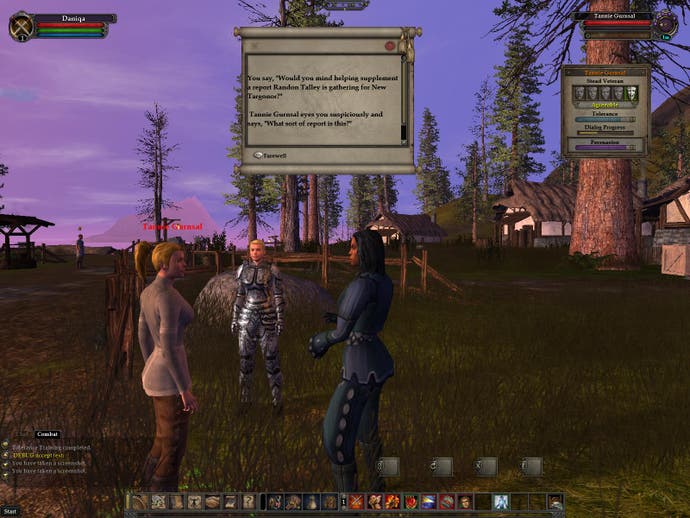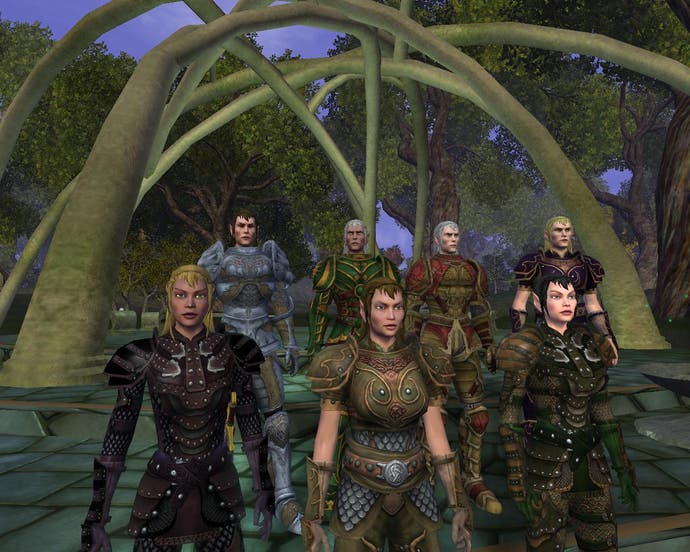Vanguard: Saga of Heroes
Will it make you say wow?
Perhaps, on reflection, Sigil Games might feel that putting the word "Saga" into the name was asking for trouble. Calling a game a "Saga" of anything, aside from inviting silly jokes about old age pensioners that don't play very well beyond England's shores, also practically guarantees that your development process will indeed become a Saga - a long, drawn out and somewhat painful experience abounding with whispered half-truths and vague generalisations. Still - even given the number of misconceptions and conflicting views which exist on the topic of Vanguard, Sigil's developers can at least count themselves lucky that they avoided the "Forever" pitfall, eh?
Misconception Numero Uno, and possibly the single biggest communications nightmare facing Sigil, is the entirely understandable belief that Vanguard is a hardcore MMORPG, designed for ultra-hardcore MMORPG players - the kind of people who turn up their noses at World of Warcraft for being "too casual", and who are colloquially known as "bottle-pissers" due to an often committed, yet rarely confessed, act of desperation during extremely long MMOG raiding sessions. Hey, it's a lifestyle choice, and if you're happy with that, then good luck to you - at least you're not doing anything genuinely odious, like buying Jimmy Carr DVDs. However tolerant we may pretend to be of the bottle-pissing masses, however, the fact is that if Vanguard was really designed to appeal to that market, the game would crash and burn instantly - there simply aren't enough truly hardcore MMOG fans out there to support an ambitious project like this, after all.
It's easy to see where the misconception came from, though. After all, the CEO of Sigil Games is Brad McQuaid; the president of the company is Jeff Butler. Both men were incredibly influential figures in the development of EverQuest, and McQuaid's name in particular is almost synonymous with the groundbreaking MMOG. And indeed, early on in development of Vanguard (we're talking way back in the mists of 2002, here) Sigil did make a number of statements that seemed designed to appease the EQ playing demographic - comments about how they wouldn't water down the gameplay to give Vanguard a broader appeal, and so forth. Reports from very early betas seemed to confirm that while it may have headline features like the ability to buy houses and other property, or to craft sailing ships and scoot around the oceans on them, or realistic real-time weather effects, this still wasn't a game for the faint of heart. The majority of the right-thinking world, who were quite happy to consider themselves rather too faint of heart for most MMOGs, wrote Vanguard off as a curiosity for the hardcore.
Whole New World

Then Blizzard burst onto the MMOG scene, and World of Warcraft happened. One has to wonder whether it's galling for industry veterans like Brad McQuaid or Ultima Online creator Richard Garriott to witness the success of World of Warcraft, a game which basically took the rule book they had written for the MMOG genre and rewrote entire sections of it, with one fell swoop recasting a genre most commentators believed had a maximum market of half a million people as one where seven and a half million people could get on with just one game. Whether people like McQuaid ever felt a little chafed by WoW's success or not - Sigil's staff are certainly far too polite to ever express anything but the most heartfelt congratulations for Blizzard in interviews - the team behind Vanguard was certainly not too proud to realise that the earth had just moved under their feet. Comments from beta testers - and changes in tune from the firm itself - show a major transition taking place for Vanguard in the wake of WoW's success, and the influence of Blizzard's behemoth is clear in the game as it stands today. Call it homage, call it plagiarism, call it learning - call it what you like, it makes Vanguard a better game.
All of a sudden, with our preconception of Vanguard as a hardcore-only, newbie-unfriendly, bring-an-empty-bottle kind of game utterly smashed, we're interested. Very interested - because Vanguard has always been undeniably ambitious and forward-looking, filled with fascinating ideas and features, but up until now we had assumed that they'd be locked away behind a basic grinding and raiding structure which wouldn't fit in with, you know, jobs and partners and sleeping and eating and cleaning ourselves and so on. Not so.

A little background, then, on Vanguard's world. Sigil has created an incredibly expansive world for the game, which will initially be formed of three enormous continents - each of which plays host to a different set of races. In total, there are something like 17 playable races in the game, most of which conform to a variety of well-established fantasy archetypes - humans, barbarians, various elves (dark elves, wood elves, organic GM-free elves, and so on), goblins, orcs, dwarves, half-giants, etc. There are also three anthropomorphic races, who look in turn like humanoid cats, foxes and wolves - so we sincerely hope that Sigil has the good sense to set aside an isolated server for all the furries to run around yiffing on (if you don't know what that means, just take my word for it that it's horrible, and for the love of GOD don't type "furry yiffing" into Google, especially if you're at work).
(You just did, didn't you? Well, I warned you. It's not my fault that now you're going to have to cut your eyes to drain out the evil.)
Each of the races looks very distinct, so you should see far fewer "clones" in Vanguard than you see in other games - but more importantly, Sigil has opted to provide an astonishingly powerful set of tools to players for character creation. Every element of your character's features can be modified, ranging from height and body mass to tiny details like how close-set the eyes are and how large the hands are in proportion to the rest of the body. The final results can, admittedly, look very bizarre - but with a little tweaking you can make a huge range of attractive, or at least interesting, characters, and the chances of running into a doppelganger are incredibly slim.
The Class Divide

Each of the 17 playable races can choose from a number of character classes - there are 15 in total in the game at present (more will be added after launch, we're assured), but no one race can access all 15 classes, so choosing the right race and class combination is vital (thankfully, the screen where you roll your character is extremely simple and intuitive when it comes to these options - click on a character class, and the races which can play that class are highlighted; click on a race, and the classes it can play are highlighted). These classes range from straightforward "ugh me hit things" guys like the Warrior, through to much more interesting and (somewhat) original classes like the Psionist and the Blood Mage.
Now, at this point you're probably thinking the same thing we were - that having 17 races and 15 classes sounds bloody complicated, and immediately off-putting for the average player. However, Sigil has cunningly decided to actually break down all its character classes into four broad categories - Defensive Fighters, Offensive Fighters, Arcane Casters and Healers. This makes finding the type of character you want to play much easier, and to the developers' credit, each class within the "class grouping" plays very differently. Although I play a Paladin of some description in almost everything (get your booing, hissing and calls for nerfing in now, WoW types!), it's hard not to be attracted by the Blood Mage, who basically forms blood pacts with both those he is healing and those he is dealing damage to, and the Necromancer, who can animate corpses to fight for him. Best of all, each of these classes plays uniquely from the outset - Sigil recognises that all too many games start out casting classes that should be interesting, in theory, by making them stab things with daggers for five to ten levels, so they've ensured that a core skill that demonstrates the unique nature of the class is available to players from the outset.

Of course, having so many classes and races does open up a potential nightmare in balancing - it's going to be astonishingly difficult for Sigil to keep every class useful and unique as the game advances, and the balancing act facing the developer in ensuring that players don't end up with a character they've invested months of time in which is now totally unwanted by all raid groups and guilds is not one we envy. It is, however, a serious concern for players - and it's the first inkling that the factor most likely to trip Vanguard up is its own lofty ambition.
That ambition is clear in a great many aspects of the game, not just in the sheer number of races and classes which it hosts. It's clear in the enormous scope of the world itself, which the gorgeous graphics engine (still somewhat glitch and pop-up prone sadly, but improving with each code update, thankfully - whether that's fast enough improvement to make the game fully polished in time for release is another question) renders as one huge environment. "If you can see it, you can go there," is the team's proud catchphrase for the engine - no load delays, no zoning, just vast horizons that you can happily march towards all day. In fact, the world is so vast that the team has had to introduce the first horses to players at level 10, much earlier than most games - your mounts (there are dozens of animals that can be used as mounts in the game, another ambitious move on the part of the developers, and mounted combat is on the roadmap post-release, we're assured) gradually get faster as you approach level 40, and then you can get one of several types of flying mount. Unlike World of Warcraft's flying mounts, which only work in the new Outland zones of The Burning Crusade expansion pack, Vanguard's flying mounts can bring you anywhere.



